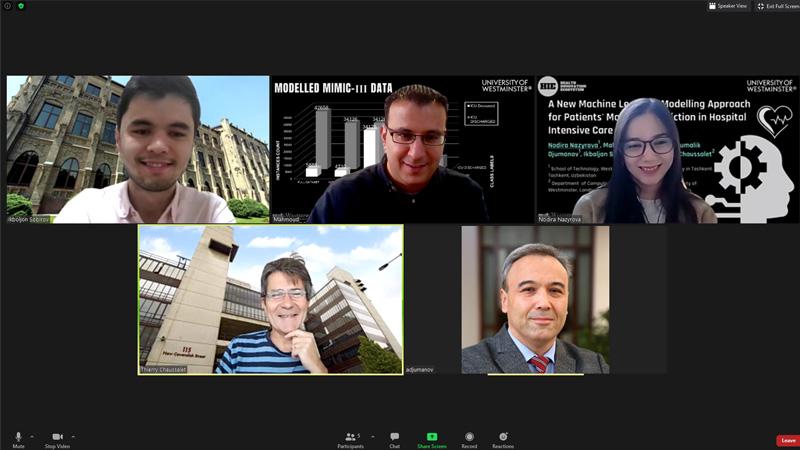The paper entitled ‘A New Machine Learning Modelling Approach for Patients' Mortality Prediction in Hospital Intensive Care Unit’ written by researchers from Westminster and Westminster International University in Tashkent (WUIT) received the Best Oral Presentation Award at the International Symposium on Bioinformatics and Biomedicine (BioInfoMed 2020).

The paper was written by Mahmoud Aldraimli and Professor Thierry Chaussalet from the School of Computer Science and Engineering and the Health Innovation Ecosystem (HIE) and Nodira Nazyrova, Abdumalik Djumanov, and Ikboljon Sobirov from the School of Technology at Westminster International University in Tashkent (WIUT).
The symposium was held between 8-10 October 2020 and was hosted by the Institute of Biophysics and Biomedical Engineering at the Bulgarian Academy of Sciences, the University Multidisciplinary Hospital, and the Union of Scientists in Bulgaria. It gathered hundreds of participants from universities around the world to present their state-of-the-art research and innovation in the field of biomedicine, bioinformatics, computer technologies, public health, and quality of life.
The paper uses a data science approach to build and evaluate the performance of over one hundred machine learning models to predict mortality for around fifty thousand ICU admissions extracted from the Medical Information Mart for Intensive Care III (MIMIC-III) repository. Nodira Nazyrova, Ikboljon Sobirov and Mahmoud Aldraimli conducted the analyses and model building, while Abdumalik Djumanov and Thierry Chaussalet took on a supervisory role. The presentation itself was prepared by Mahmoud and delivered by Nodira.
The work is part of the project ‘Intelligent Predictive modelling of Healthcare Events’, led by Prof Thierry Chaussalet and supported by a Collaborative Research Project grant from WIUT, with the overall objective to support and strengthen research at WIUT and research active staff mobility between WIUT and University of Westminster.
Talking about the event, Mahmoud Aldraimli, Research Fellow Data Scientist in the HIE at Westminster, said: “The inability to travel to conferences during a pandemic adds a challenging layer to presenting research for impact and engaging with your audience. We learnt a big deal, and it has been a great event, so we are very thankful to the organisers for making this happen.”
Nodira Nazyrova, Lecturer in Business Information Technology at WIUT, commented: “Building Machine Learning models requires expert computing resource. Despite the lockdown milestone halfway through the project, we pulled it together and sustained our momentum by replacing physical access to computing power with a virtual one that worked well.”
Professor Thierry Chaussalet, who also leads the HIE and the Health and Social Care Modelling Group at Westminster, added: “None of this would have happened without the talent and drive of everyone at WIUT and Westminster. There is no doubt there is incredible research strength at WIUT, ready to be ignited.”
The Health Innovation Ecosystem (HIE) is an Westminster initiative focused on interdisciplinary innovation in national and international health research and knowledge exchange supported generously by the Quintin Hogg Trust.


